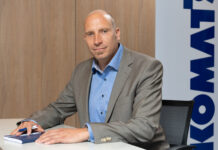
WHEN Tom Blackwood bought out his retiring father, Tom Senior, in 2001, Blackwood Plant Hire consisted of a few machines.
Today, the Stewarton-based firm has 260 excavators, 150 employees and a projected turnover of £12 million.
It’s been a phenomenal success story for a company that specialises in the hire of operated and self-drive plant to major infrastructure and utilities organisations throughout central Scotland and the UK.
With a fleet of excavators, backhoe loaders, site dumpers, articulated dump trucks and compaction equipment, it has built an impressive network of clients, supplying to major Scottish contractors such as Balfour Beatty, Raynesway, Carillion, AMCO and Scottish Water.
Tom explained, “My father started Blackwood Plant Hire in 1960 so I’ve always been around the plant industry. My dad was a contractor, involved in farmwork and drainage. When he retired in 2001, he had just a few machines left.
“I’d been working in the industry all my adult life. I left school at 16 and worked for various plant hire companies before joining Lindsay Plant in Kilmarnock. This was a very successful company and I had two great teachers in George and Jim Lindsay, who taught me everything I know. I was an operator with them before moving into the workshop. I then helped to run the firm’s rail division.”
Tom has spent the past 14 years building Blackwood Plant Hire into one of the biggest companies of its kind in Scotland. He says their big break occurred about ten years ago when they won the contract to supply plant equipment for the Ardrossan bypass project.
“We were still a small firm at that point,” Tom recalled. “I remember phoning Volvo to ask how many machines they could give us!
“We’ve grown the business over the years. The recession had a huge impact on us and in 2010 90% of our fleet was in the yard because there was no work.
“We worked hard and spent a bit of money getting accredited to work on railways and power networks. That saw us through those years. These areas have remained a big part of our business, though housebuilding has picked up again.
“Our turnover has steadily increased. Last year was £8 million and projected turnover this year is £12 million.”
One aspect of the recession which has had a lasting impact on Blackwood, and other plant firms, is the lack of available skilled operators. Tom says the biggest challenge his business faces is finding the right people.
“We have fantastic staff,” Tom added. “Very few people leave us. We don’t have a high turnover of staff at all which gives us consistency. But good drivers are becoming harder to find.
“A lot of quality people left the industry during the recession and have found other careers. Once they have left it’s very hard to get them back again.
“I’d love to open a training academy. It would be feasible if we got help from the Government but the cost would be huge. I definitely think this would be the way forward.
“We try to attract quality people by paying employees well and providing company vans, but it’s getting harder to get the right people. If we could train guys up, teach them how to use our kit, I think it would be a huge advantage.
“Hopefully once trained we would have a great, loyal asset to our company. Good operators, good machines and good service are key in this industry.
“I’m often asked by people how to get a start as an operator. The advice I give is not to expect too much, too soon.
“They shouldn’t be afraid to get their hands dirty. I’ve seen some people come in and expect to be operators immediately but it’s best to start in the yard washing machines, get to know their way around the equipment and after a while they can go through the CPCS course, get their ticket and get placed on easier sites.
“We’ve got people who started that way and are now good, quality operators.”
While Tom is optimistic about the future, one thing which frustrates him about the industry is the rates being paid to hire top quality plant equipment.
“You’ve got £100,000 machines going out for £30 an hour with a driver,” he said. “To put that in perspective, if your washing machine breaks down it costs £50 an hour for a guy to go out with a small bag of tools.
“For us, service is massive. We’re not the cheapest out there but we try to offer the best service, focusing on training, health and safety and machine maintainence.
“We try to replace our machines once they are three-years-old, which unfortunately means changing 80 machines a year.
“Most of our machines are either Cat or JCB. We have a splattering of others but we get great service from both our main suppliers.
“When purchasing machines we look for quality, good back up and strong residual values.
“80% of our machines are in use at the moment over the winter months. For the rest of the year our average utilisation is 90%.
“The industry has become more demanding. Health and safety is a bigger issue than ever, with all-day inductions before drivers or engineers are allowed to go onsite.
“There is also greater demand to react instantly when a machine breaks down. There’s not the same patience there once was.
“In the future I can probably see us opening another depot. We cover the whole of the UK at present and we’re flat out in Scotland, so it may be good to have a base in the north of England.”
Tom’s main hope for this year is to get his employees all buying into the Blackwood “brand”.
“Not one part of the business is more important than another,” he added. “Whether you work in the workshop, office or as an operator, everyone has to pull together as a team.
“In 2009 I started Paul McCormack (formally of Malcolm Plant) to help me with the hire desk.
“This has evolved and now Paul handles the day to day running of the business allowing me to concentrate on the financials and machine deals.”
Blackwood recently purchased 100 new JCB and Cat models worth nearly £6 million as it gears up to handle major projects.
The latest deal sees the company add a broad spectrum of equipment including: 13-36 tonne tracked excavators, 3CX backhoe loaders, articulated dump trucks and Loadall telescopic handlers to its fleet.
Paul McCormack said, “We have continued to invest in our fleet as part of our ongoing expansion and will continue to do so in the coming year.”








